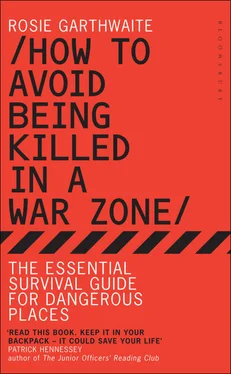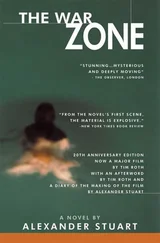Be aware of new people around you, new cogs in the wheels that keep you safe as you move from A to B. Make sure you have someone you trust in charge of vetting the people close to you.
Try to look and act as if you are not worth much.This is most important when meeting new people so that they do not know you have any kidnap value.
Always let trusted people know your movements:where you are going, when you will be back, or when you are likely to call in to let them know you are safe. Give your call list(see Emergency Numbers) to someone you can trust.
If you are lucky and your organization has taken out K & R insurance, a whole team of trained negotiators will kick into action. You might even have Sue Williams looking after you. However, you are unlikely to know if this insurance is in place, and it’s better that you don’t. If you are kidnapped, you might reveal it to your kidnappers, and suddenly you are more valuable. For the same reason, nobody else should know if you have K & R insurance; they will understand the value it carries in potential ransom payout.
If the insurance is in place, it is the insurance company’s job to get you out alive, and that often means throwing money at the problem – money that a family or company might not otherwise have been able to afford.
It is worth pointing out the possibility of K & R insurance to your boss if you think you might be in real danger. It is also possible to take out such insurance yourself.
If you find yourself in the horrible position of being a hostage, James Brandon offers the following advice about how to conduct yourself: ‘During my interrogation, every minute or so a man cocked a gun, put it against my head and pulled the trigger. I never knew if there would be a bullet in the next chamber. When my feet started shaking I pushed down hard to hide it from the kidnappers. I knew that if they knew I was afraid it would give them more power – and make them contemptuous of me.’
Sadly, the stress of being kidnapped can have long-lasting traumatic effects even when it’s all over. And this can affect not only the hostage, but family and friends too. Everyone will have been through hell. Chapter 15 offers advice on how to handle and treat trauma. It also includes a list of books and people you can turn to for further help.
Be aware of propaganda. Be aware how you might be used to manipulate a story. As an aid worker, I was always aware that I might be killed and used by the other side as propaganda.
Dr Carl Hallam
14/ Surviving in Potential Trouble Spots
Approach people with innocence and a confident manner. Never assume a group you are approaching will be against you. If you go in with fear or expecting trouble, you will get into trouble.
Wadah Khanfar , director-general of Al Jazeera
So far this bookhas focused on places where war is actively being waged. Now it’s time to look at some other potential trouble spots.
Among my colleagues it’s become a cliché to talk about holidaying in George W. Bush’s ‘axis of evil’. After all, it’s where many of them spend most of their working lives. However, countries such as Iran, Myanmar, North Korea and Yemen are places of mystery and rumour to many people, and what they see of them in the news can make them seem a little scary.
Whenever I’m going somewhere new I find a little advice from people in the know helps me to dismiss preconceptions and begin to root my understanding in the human culture of a place rather than its politics. So let’s take a look at some of the less well-known trouble spots and get some insight from people who know them.
Nazanin Sadri was working as a journalist in Tehran during the 2009 post-election riots. They were violent, and dozens of journalists were targeted by the government and thrown into prison during and even after the demonstrations. It took brave protesters and bold journalism to bring the story to the world via the Internet and other means. For Naz it involved an even more careful balancing act. Her family is Iranian and she did not want to put any of them at risk. As a woman too it was far harder for her to go unnoticed.
For men, Iran is a relatively simple place – difficult from a surveillance and legal point of view, but basically a safe place if you stick to the rules, which are mostly to do with paperwork and deference to the right people. One of the rules is to avoid body contact with women. Be aware of this if you have women around you. You will not be allowed to enter some places because there are women present. Make sure you ask before walking around someone’s house or office. And be patient: the bureaucracy will lead you somewhere…eventually. Don’t expect things to move at a normal pace, or for anything to be open when you expect it to be.
This is Naz’s advice for other women planning on travelling to the Islamic Republic of Iran:
‘Of course, the most important thing for a woman is to remember her headscarf. This does not have to be anything heavy duty. Nowadays it’s easy, given the popularity of pashminas and other scarves. People spend a lot of time worrying that they are showing too much hair, but that’s not normally a big problem, unless you are in one of the more religious towns or government buildings. Scarves can be any colour or style, but it’s a good idea always to have a conservative black one on hand. And make sure it’s cotton, not silk or any other material. You will be running round, stuck in traffic, eating and working in it the whole time, so it’s best that it doesn’t bother you too much. You just want it to stick on your head and cover your neck. If you want, you could get a bib-type of thing, like nuns wear. Have a look in the local market when you get there.
‘As for the rest of the body – cover the arms and bum, and the legs at least down to your knees. In winter, you can wear a normal winter coat (I once saw a woman stitch two airline blankets together to make a poncho for herself before she landed as she had forgotten to bring a coat). In summer pick something loose, cotton and easy to walk around in. For obvious reasons it should not be too tight or skimpy. Some people get away with a long shirt over some baggy trousers, like a shawa khameez .
‘For attending government events, mosques and funerals and visiting the holy city of Qom you will need a chador – a massive piece of black cloth. You can buy or borrow this once you’re in the country. They give them out at mosques before you enter. Just drape it over you and keep your normal scarf and coat on underneath. It’s uncomfortable and a pain, but you’ll get used to it.
‘Generally speaking, try not to show your legs or ankles. Even in the summer when it is hot, if I’m wearing flat shoes, I always carry a pair of black socks in case I’m going somewhere that’s a bit more conservative. Avoid bare feet.
‘Don’t shake hands with official figures and government types unless they put their hand out. Don’t initiate a handshake yourself. In public don’t hold hands, hug or kiss members of the opposite sex on the cheek. You will see Iranian people do this, but if you’re just working there, I think it’s best to keep safe and generally give an air of modesty.
‘In working situations you will be surrounded by men and spending a lot of time drinking small cups of tea as you gather information, permissions and so forth. Stay patient – it’s quite bureaucratic. Take tea if it’s offered – it breaks the ice.
‘Being a woman can actually be an advantage. For example, if I find myself surrounded by a lot of men, as in government departments, I tend to flatter them, ask them about their wives and children. There are few places where you can’t go – but make sure you ask before going anywhere, just in case. You don’t want to wander into a politically or religiously sensitive place.
Читать дальше




![Джонатан Димблби - Barbarossa - How Hitler Lost the War [calibre]](/books/385421/dzhonatan-dimblbi-barbarossa-how-hitler-lost-the-w-thumb.webp)







